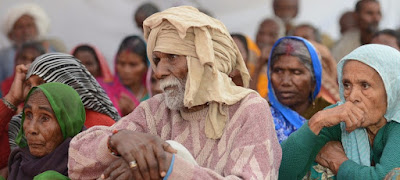दलितों के हितैषी तो सभी बनते हैं लेकिन सैप्टिक टैंकों में हो रही मौतें कोई नहीं रोक पा रहा
प्रधानमंत्री नरेन्द्र मोदी ने कुंभ के मेले में सफाई करने वाले पांच कर्मचारियों के पैर धोए थे। प्रधानमंत्री यह दिखाने का प्रयास कर रहे थे कि यह कार्य इतना महत्वपूर्ण है, इसमें कार्यरत श्रमिक भी उतने ही महत्वपूर्ण है, इसलिए ऐसे देश सेवकों का सम्मान किया जाना चाहिए। प्रधानमंत्री मोदी द्वारा चलाए गए देश स्वच्छता अभियान में इन सफाईकर्मियों का सर्वाधिक योगदान रहा है। सवाल यह है कि जब सफाई श्रमिकों का काम इतना महत्वपूर्ण है कि प्रधानमंत्री तक ने उनके चरण धोकर उनकी सराहना की है, तब सैप्टिक टैंक में श्रमिकों के मरने की घटनाएं रूक क्यों नहीं रही हैं। गुजरात में जून के दूसरे सप्ताह में सैप्टिक टैंक में गैस से दम घुटने से सात सफाई श्रमिकों की मौत हो गई। इस घटना को पन्द्रह दिन ही बीते कि रोहतक में चार श्रमिकों की सैप्टिक टैंक में मौत हो गई।
फिर आखिर ऐसे कौन-से हालात हैं कि गैरकानूनी घोषित होने के बाद भी श्रमिक सैप्टिक टैंक में सफाई के दौरान जान गंवा रहे हैं। इस कानून की हालत भी दूसरे ऐसे ही कानूनों की तरह कागज काले करने जैसी हो गई है। इस कानून को बनाते समय नीति नियंताओं ने यह ध्यान नहीं रखा कि आखिर कानून से पाबंदी लगा दी गई तो इस तरह के जोखिम भरे काम में लगे श्रमिकों के सामने आजीविका चलाने का संकट खड़ा हो जाएगा। कानून में रोजगार के इंतजाम का वैकल्पिक उपाय नहीं किया गया। इस कानून के साथ रोजगार की गारंटी भी दी जानी चाहिए थी। केवल कानून बनाने से समस्या का समाधान ढूंढ़ने की नेताओं की आदत हो गई है। उसके व्यवहारिक पक्षों और प्रभावों पर किसी का ध्यान नहीं जाता। दरअसल कानून बनाना आसान है और रोजगार का इंतजाम करना मुश्किल है।
सफाई कमचारी आंदोलन का कहना है कि पिछले एक दशक में करीब 1800 सफाईकर्मियों की सैप्टिक टैंकों में सफाई के दौरान मौत हो चुकी है। इन मौतों से भी सरकारों की कुभंकर्णी नींद नहीं टूटी। दरअसल ये मौतें वोट बैंक बनाने में महत्वपूर्ण साबित नहीं हुईं। अलग−अलग समय पर हुई इन मौतों को चुनावों में भुनाया नहीं जा सका। ऐसे कामों से होने वाली मौतों को रोकने के लिए सिर्फ कानून बनाकर सरकारों ने अपने दायित्वों से पल्ला झाड़ लिया।
यही वजह है कि कानून बनाने के बावजूद दुर्घटना होने पर आरोपी को सजा तो मिल सकती है किन्तु ऐसी घटनाओं की पुनरावृति नहीं हो, इसके उपायों को दरकिनार कर दिया गया। सफाई श्रमिकों को इससे फर्क नहीं पड़ता कि उनका काम सामाजिक दृष्टि से हेय होने के साथ ही खतरनाक भी है। ऐसे काम का जोखिम वे अपने परिवार पालने के लिए उठाते हैं। चुनिंदा शहरों को छोड़ भी दें तो कस्बों और गांवों में सैप्टिक टैंक खाली कराने के वाहन उपलब्ध नहीं हैं। ऐसे में इस काम को कराने के लिए सफाई श्रमिकों को ही बुलाया जाता है। यह श्रमिकों की किस्मत ही है कि इस काम को करने के बाद भी वे सही सलमात बच निकलते हैं।
आश्चर्य तो यह है कि आजादी के बाद से देश के हर क्षेत्र की सूरत−सीरत बदली है। नहीं बदला है तो सिर्फ दलित बस्तियों और श्रमिकों का सैप्टिक टैंक की सफाई का काम। देश के लगभग सभी हिस्सों में सार्वजनिक और निजी सफाई के कामों के लिए आज भी दलित वर्ग अभिशप्त है। केन्द्र और राज्यों में किसी भी दल की सरकार रही हो, राजनीतिक दल सिर्फ सत्ता हासिल करने के लिए इनके आरक्षण और संरक्षण की दुहाई देते हैं, इनकी दुश्वारियों से किसी को सरोकार नहीं हैं। अस्पृश्यता का कानून बना दिए जाने के बावजूद गांवों में दलित बस्तियों की हालत बेहद शोचनीय बनी हुई है। गांवों में मुख्य आबादी से दूर कोने में ऐसी दलित बस्तियां देखी जा सकती हैं। उनमें बिजली−पानी का इंतजाम भी रामभरोसे है। सार्वजनिक बोरिंग और नलों से दलित अभी भी आसानी से पानी नहीं भर सकते।
कानून से बेशक उनको संरक्षण मिल गया हो, किन्तु इसका क्रियान्वयन और जागरूकता पूरी तरह आज तक नहीं हो पाई। हरिजन और दलितों को आरक्षण का भी नाममात्र का फायदा मिल सका है। जातिगत आधार पर सामाजिक विषमता के कारण निजी क्षेत्र में भी अपवादों को छोड़कर दलितों के लिए रोजगार के दरवाजे बंद हैं। नाम के पीछे जाति आते ही उन्हें टरका दिया जाता है। निजी क्षेत्र में उन्हें ज्यादातर सफाई जैसा कार्य ही नसीब होता है। ऐसी हालत में जब सरकारी रोजगार नाममात्र का हो और निजी क्षेत्र में भेदभाव हो, तब दलितों के पास सैप्टिक टैंक की सफाई जैसे कार्य की मजबूरी के अलावा कुछ नहीं बचता। जातिगत आधार पर रोजगार और काम के लिहाज से दलित वर्ग नगर निगमों, परिषदों और नगर पालिकाओं में सफाई के कामों से ही जुड़े हुए हैं। सरकारों ने कभी इस वर्जना को तोड़ने का प्रयास ही नहीं किया कि आखिर दलित ही क्यों सार्वजनिक सफाई के कामों में लगे। यदि दूसरी जातियों के आगे नहीं आने और मशीनों की कमी से सफाई कार्य संभव नहीं है तो दलित ही इन कामों को अंजाम क्यों दें। शहरों में दलितों के हालात बेशक कुछ बेहतर हो सकते हैं किन्तु गांवों में अभी नारकीय हालात बने हुए हैं।
पशुपालन के जरिए आमदनी करने के नाम पर दलितों के हिस्से में सुअर ही आते हैं। गाय, बकरी, भैंस जैसे दुधारू जानवर पालना इनके बूते से बाहर है। सरकारों ने कभी इस दिशा में भी गंभीरता से प्रयास नहीं किए कि दलित केवल सुअरों के आधार पर आजीविका तक सीमित नहीं रहें। इस वर्ग का आर्थिक आधार ऊंचा उठाने के लिए दूसरे दुधारू जानवारों को पालने के लिए प्रोत्साहित किया जाए। इसके लिए इन्हें ऋण−अनुदान दिया जाए। दलितों के सफाई कामों से जुड़े होने और सैप्टिक टैंक में होने वाले हादसों तब ही रूकेंगे जब पहले सरकारें पहले अपनी मानसिकता बदलें। जब तक सरकारों का नजरिया नहीं बदलेगा तब तक दलितों की दयनीय हालत भी नहीं बदलेगी।
-योगेन्द्र योगी













